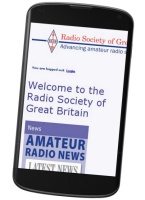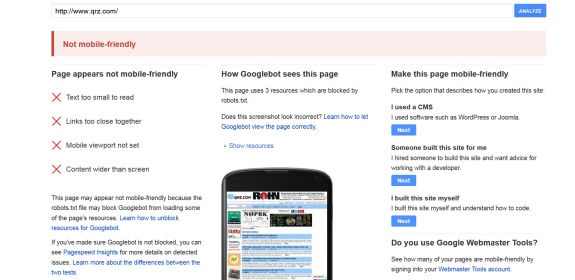 Today, the 21st of April 2015, sees a significant change taking place under the hood of the Google search engine. The results that you see when searching with Google will change to favour sites that are optimised for use on mobile devices.
Today, the 21st of April 2015, sees a significant change taking place under the hood of the Google search engine. The results that you see when searching with Google will change to favour sites that are optimised for use on mobile devices.
Google is doing this to offer a better experience for those using mobile devices, and is being billed as a significant change (Source: Google Webmaster Central) – According to Google, around 50% of searches come from mobile devices, hence this is an important move for Google.
On this page, we take a quick look at how these changes may impact amateur radio websites, and how without action, some of our amateur radio club websites may be even harder to find after this change by Google.
Amateur Radio Websites
As someone who spends a lot of time accessing websites on mobile devices, it’s fair to say that sites not optimised for mobile, are a pain – unreadable text, issues with scrolling, troublesome image sizes. Amateur radio websites seem particularly unfriendly in many cases.Whilst sites like the RSGB are showing as friendly, other, such as QRZ.com, fail.
With the new changes being rolled out by Google, we’re likely to see some websites start slipping even further down the rankings, which is not great for the visibility of our hobby.

Checking Your Website
Google has released an online tool to allow webmasters to check their mobile friendliness:
Google Mobile Friendly Test
Essex Amateur Radio Sites
We tested each website for the 18 clubs in Essex that run a website, on the morning of the Google switch – Well done to the following sites for being Mobile Friendly:
- Essex Amateur Radio DX Group
- Essex CW Club
- Essex Ham
- Harlow & District Amateur Radio Society
- Havering & District Amateur Radio Club
- Thurrock Acorns Amateur Radio Club
Of the top ten club sites in Essex (based on search rank and traffic), only three pass Google’s Mobile Friendly test – Here’s the results, sorted alphabetically:
| Chelmsford Amateur Radio Society (CARS) | Fail |
| Colchester Radio Amateurs (CRA) | Fail |
| Dengie Hundred Amateur Radio Society (DHARS) | Untestable |
| Essex Ham | Pass |
| Harlow & District Amateur Radio Society (HADARS) | Pass |
| Harwich Amateur Radio Interest Group (HARIG) | Fail |
| Loughton & Epping Forest Amateur Radio Society (LEFARS) | Fail |
| South Essex Amateur Radio Society (SEARS) | Fail |
| Thurrock Acorns Amateur Radio Club (TAARC) | Pass |
| Vange Amateur Radio Society (VARS) | Fail |
Reasons for the FAIL for many of the clubs in Essex include “Text too small to read”, “Links too close together”, “Content wider than screen” and “Mobile viewport not set”.
Combine this with other issues with club websites, such as poor attention to search engine visibility, page errors, and content issues (as highlighted recently on Charlie M0PZT’s Spurious Emissions blog), it’s clear why some club websites are struggling for traffic – and that’s likely to become even worse when today’s Google updates are rolled out. I’ll be watching the rankings carefully to keep track of the winners & losers!
Google Friendliness
Before the complaints roll in – this is not a finger-pointing exercise on our part, neither is this a competition – this is to highlight an issue affecting many of the UK’s ham radio websites and to encourage local clubs to think more about the online visibility of their clubs and the hobby in general.
Amateur radio club sites typically serve a small audience and get low traffic – so to ensure that amateur radio gets the maximum exposure possible, it’s important that amateur radio sites can be found when searched. With so many of the youngsters we’re desperate to get into the hobby glued to smartphones and tablets, can we afford not to make sure that our sites are as accessible and visible as possible?
Written by Pete M0PSX (When not playing amateur radio, Pete is a website / SEO consultant)
Related Links
Update
Thanks to @PeterOnion for asking: “How does this effect results returned to people on proper computers with sensible sized screens? I don’t care about /m friendly” – It seems that the changes only affect results on mobile devices, not on desktop searches… at least for the moment. With 50% of searches being done on mobiles, this is still a big issue though.


May I ask how you’re getting your data to form the ranking of the top ten clubs in Essex please?
Sure – It’s a weighted value calculated from three metrics – global site ranking, SERP and trust score.
Not perfect, I know, but a mix of number of visitors, what Google thinks of it, plus how well other sites trust it, gives a good feel for how well a site is doing in a niche.
Ping me a mail if you want the maths, or the stats for a specific site and I’ll show you my workings!
It seems to me that making changes to a website to make it mobile-friendly can make it desktop-hostile too. I’ve seen one amateur radio website with a font size is so large that it is difficult to use on a desktop. The page says something along the lines of “if you find the font too large, configure your browser to reduce it”, but the webmaster doesn’t seem to understand that that will affect all websites viewed in the browser and not just theirs.
I guess the real answer is to server different versions of the pages depending on what type of device is accessing it. Personally though, I have more than enough to do and feel this is a step further than I have time for, and for a website on shared hosting, I prefer to use static pages and I’m not keen on making all web pages on the site dynamic.
73 de Graham G3ZOD http://fists.co.uk
Hi Graham,
All valid, and this is very similar to the debates webmasters had years ago about make sites accessible to the visually-impaired… it can be a huge amount of work for little reward.
To an extent, this particular change only affects clubs and amateur radio sites who care where they appear when searched in Google.
You guys rank very well – for example “morse code clubs” brings up your site as the first result. If, for example, your site dropped in rankings from #1 to #11, that may cause a problem for getting people to find you.
Admittedly, in general, amateur radio clubs exist to serve their members, and members know how to find a club’s site without needing to use Google. It may only be an issue for clubs keen to attract new members or generate leads for training courses – where if their site doesn’t appear close to the top of the Google results, they’ll not be found.
Pete
I’ll add this, too – you don’t need to make your club’s site dynamic to get the advantages of a mobile style. It does, however, require using mobile aware techniques. The Bootstrap CSS framework (and many others) let you serve up one style sheet and one page (either static or dynamic) for desktop, tablet, and phones while not sacrificing readability and style. Check it out at http://getbootstrap.com/css/
Is it a change to what you’re doing? Yes.
Is it the worst thing ever? No.
It is possible for the webmaster to serve up different content, based on the device. I’m no web design expert, but I have some CSS that will display differently on mobile, desktop and printers. In fact, they are all set up the same, so I’m not making use of it, since as someone else points out, it can be a lot of effort.
If for example I look at this page, there is green down each side. If someone was to print the page, it would be sensible that the green was not printed, to save using up all their toner. So a “printer friendly” version would not display the green. (If I play with scamcers, which I sometimes do, I try to force them to print pages that use up all their ink!)
I’m webmaster for the Dengie Hundred Amateur Radio Society (DHARS) http://www.dhars.org.uk/ and try to at least make sure all pages pass the W3C validation suite. FWIW, I write the pages in a text editor called “vi”, which some of you may know, as it has been around for 38~39 years.
Dave
Hi Pete.
Many thanks for the insight in your original post and follow-up.
It’s certainly a subject that requires consideration.
I expect in due course my conscience will force me to try and do something about it; I guess with the reduced interest in amateur radio in current times, we can’t really afford to risk missing anyone with potential interest.
73 de Graham G3ZOD
I’m puzzled why the Dengie Hundred Amateur Radio Society (DHARS) web site was untestable. But I would welcome comments about the site http://www.dhars.org.uk/
Dr. David Kirkby G8WRB
(Chairman and webmaster of DHARS)